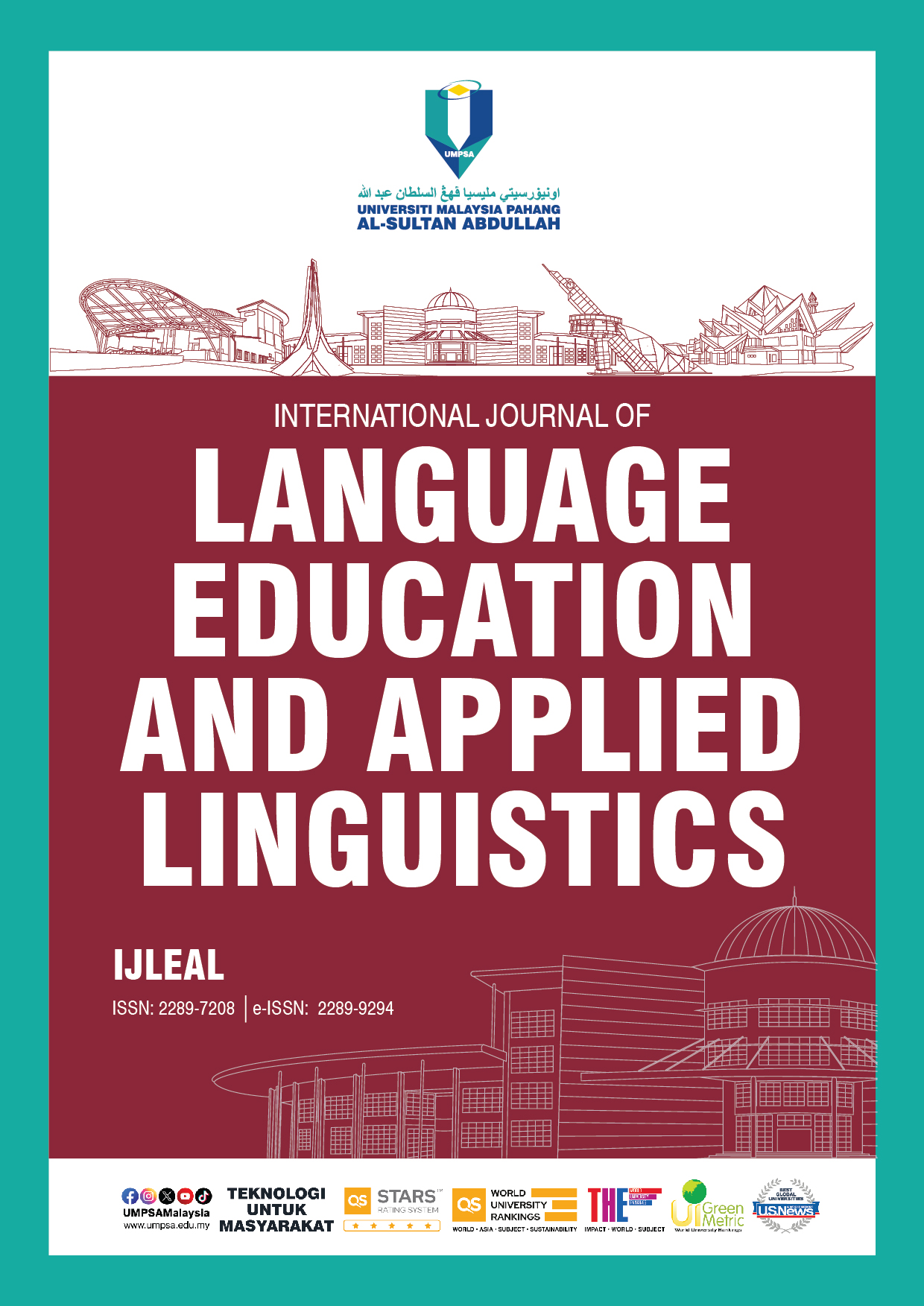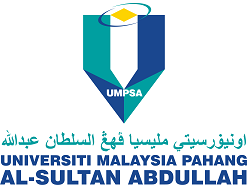A Bibliometric Analysis of Social Actions Investigated using Discourse-Historical Approach
DOI:
https://doi.org/10.15282/Keywords:
Bibliometric analysis, Critical discourse analysis, Discourse-historical approach, Social actionAbstract
This study examines the research landscape of social actions investigated using a bibliometric analysis of publications indexed in the Scopus database from 2002 to 2023. VOSviewer was used to visualise and analyse network maps of co-authorship and the co-occurrence of authors’ keywords related to DHA. The results reveal that the United Kingdom is a key contributor to DHA research, largely due to the prolific publications of Ruth Wodak, the approach’s proponent, from Lancaster University, along with contributions from her former students, Boukala and Forchtner. DHA research has expanded to 59 countries, reflecting its growing influence. However, co-authorship data indicate that research within this field remains largely confined to institutional and geographical boundaries, with collaborations involving only 13 countries. Building upon Reisigl’s review of DHA’s four phases of development, we present Phase Five (2017-2023) as a period when DHA research expands from evergreen areas (nationalism, national identity, populism, ideology and racism) in political discourse and media discourse into interdisciplinary approaches to investigate contemporary issues in social media discourse. A way forward for DHA research is application of the holistic framework involving analysis of all five discursive strategies to understand how language is used to achieve particular social, political, psychological or linguistic goals instead of selectively focusing on argumentation strategies and topos/topoi.
References
Alekseev, A. (2021). “Defend your right!” How the populist radical right uses references to rights and freedoms to discursively construct identities. New Perspectives, 29(4), 376–416. https://doi.org/10.1177/2336825X211052973
Ali, D. K. (2023). "The joker" vs. "tails": The discourses and counter discourses of Tishreen protest on Iraqi social media platforms. Journal of Babylon Center for Humanities Studies, 13(4), 101-116.
Baker, P., Gabrielatos, C., Khosravinik, M., Krzyżanowski, M., McEnery, T., & Wodak, R. (2008). A useful methodological synergy? Combining critical discourse analysis and corpus linguistics to examine discourses of refugees and asylum seekers in the UK press. Discourse & Society, 19(3), 273-306. https://doi.org/10.1177/0957926508088962
Blasio, E. D., & Selva, D. (2021). COVID-19 in Italy: Performing power and emotions. Frontiers in Political Science, 3, 1–12. https://doi.org/10.3389/fpos.2021.661378
Cao, Q., Chilton, P., & Tian, H. (2014). Discourse, politics and media in contemporary China. John Benjamins Publishing Company.
Çeçen, A. F. (2022). The clash of civilization paradigm and the institutionalization of Islamophobia in conservative party. Turkish Studies-Social Sciences, 17(2), 133-148. https://dx.doi.org/10.7827/TurkishStudies57453
Dobkiewicz, P., Chmiel, A., & Fabiszak, M. (2023). Source text ideological load modulates ideological shifts in interpreting right-wing and left-wing political discourse, but interpreters’ political orientation does not. Ampersand, 11, 1–12. https://doi.org/10.1016/j.amper.2023.100151
Erdogan-Ozturk, Y., & Isik-Guler, H. (2020). Discourses of exclusion on Twitter in the Turkish context: #ülkemdesuriyeliistemiyorum (#idontwantsyriansinmycountry). Discourse, Context & Media, 36(2), 1–10. https://doi.org/10.1016/j.dcm.2020.100400
Fairclough, N. (1995). Critical discourse analysis. Longman.
Galasinska, A., & Krzyzanowski, M. (2008). Discourse and transformation in central and eastern Europe. Palgrave Macmillan.
Ghaffari, S. (2020). Discourses of celebrities on Instagram: Digital femininity, self-representation and hate speech. Critical Discourse Studies, 19(2), 161–178. https://doi.org/10.1080/17405904.2020.1839923
Graham, P., Keenan, T., & Dowd, A. M. (2004). A call to arms at the end of history: A discourse–historical analysis of George W. Bush’s declaration of war on terror. Discourse & Society, 15(2-3), 199-221. https://doi.org/10.1177/0957926504041017
Gruber, M., Isetti, G., Ghirardello, L., & Walde, M. (2023). Populism in times of a pandemic. A cross-country critical discourse analysis of right-wing and left-wing populist parties in Europe. Populism, 6, 1–25. https://doi.org/10.1163/25888072-bja10049
Heer, H., Manoschek, W., Pollak, A., & Wodak, R. (2008). The discursive construction of history: Remembering the Wehrmacht’s war of annihilation. Palgrave Macmillan.
Hyland, K., & Jiang, F. K. (2021). A bibliometric study of EAP research: Who is doing what, where and when? Journal of English for Academic Purposes, 49(2), 1–30. https://doi.org/10.1016/j.jeap.2020.100929
John Benjamin Publishing Company. (n.d.). Journal of language and politics. https://benjamins.com/catalog/jlp
Kader, N. A. (2016). A critical analysis of anti-Islamisation and anti-immigration discourse: The case of the English defence league and Britain first. International Journal for Innovation Education and Research, 4(5), 26–53. https://doi.org/http://dx.doi.org/10.31686/ijier.vol4.iss5.538
Kovács, A., & Wodak, R. (2003). NATO, neutrality and national identity: The case of Austria and Hungary. Böhlau.
Kreis, R. (2017). The “tweet politics” of President Trump. Journal of Language and Politics, 16(4), 607-618. https://doi.org/10.1075/jlp.17032.kre
Krzyżanowski, M., & Ekström, M. (2022). The normalization of far-right populism and nativist authoritarianism: Discursive practices in media, journalism and the wider public sphere/s. Discourse & Society, 33(6), 719-729. https://doi.org/10.1177/09579265221095406
Krzyzanowski, M., Schönbauer, H., & Wodak, R. (2005). Debating the European constitution on representations of Europe/the EU in the press. Journal of Language and Politics, 4(2), 227–271. https://doi.org/10.1075/jlp.4.2.05obe
Krzyżanowski, M., & Wodak, R. (2011). Political strategies and language policies: The European Union Lisbon strategy and its implications for the EU’s language and multilingualism policy. Language Policy, 10, 115-136.
Lucchesi, D., & Romania, V. (2023). ‘Italians locked at home, illegal migrants free to disembark’: How populist parties re-contextualized the anti-immigration discourse at the time of COVID-19 pandemic. Discourse & Society, 35(1), 1–33. https://doi.org/10.1177/09579265231190504
Maccaferri, M., & Newth, G. (2022). The delegitimisation of Europe in a pro-European country: ‘Sovereignism’ and populism in the political discourse of Matteo Salvini’s Lega. Journal of Language and Politics, 21(2), 277-299.
Manoschek, W., & Sandner, G. (2008). ‘Defining the victims of Nazism.’ In H. Hannes, W. Manoschek, A. Pollak, & R. Wodak (Eds.), The discursive construction of history. Remembering the Wehrmacht’s war of annihilation (pp. 99–131). Basingstoke.
Matouschek, B., Wodak, R., & Januschek, F. (1995). Notwendige Massnahmen gegen Fremde? Genese und Formen von rassistischen Diskursen der Differenz. Passagen.
Meislová, M. B. (2021). The EU as a choice: Populist and technocratic narratives of the EU in the Brexit referendum campaign. Journal of Contemporary European Research, 17(2), 166–185. https://doi.org/10.30950/jcer.v17i2.1207
Muntigl, P., Weiss, G., & Wodak, R. (2000). European Union discourses on un/employment: An interdisciplinary approach to employment policy-making and organizational change. Benjamins.
Reinemann, C., Aalberg, T., Esser, F., Strömbäck, J., & de Vreese, C. (2017). Populist political communication: Toward a model of its causes, forms, and effects. In T. Aalberg, F. Esser, C. Reinemann, J. Strömbäck, & C. de Vreese (Eds.), Populist political communication in Europe (pp. 12–28). Routledge.
Reisigl, M. (2014). Argumentation and the discourse-historical approach: A methodological framework. In C. Hart & P. Cap (Eds.), Contemporary critical discourse studies (pp. 67–96). Bloomsbury Publishing.
Reisigl, M. (2017). The discourse-historical approach. In J. Flowerdew & J. E. Richardson (Eds.), The Routledge handbook of critical discorse studies (pp. 44–59). Routledge.
Reisigl, M., & Wodak, R. (2001). Discourse and discrimination: Rhetorics of racism and antisemitism. Routledge.
Reisigl, M., & Wodak, R. (2017). The discourse-historical approach (DHA). In J. Flowerdew & E. Richardson (Eds.), The Routledge handbook of critical discourse studies. Routledge. https://doi.org/http://www.routledgehandbooks.com/doi/10.4324/9781315739342.ch3
Richardson, J. E., & Wodak, R. (2009). The impact of visual racism: Visual arguments in political leaflets of Austrian and British farright parties. Controversia, 6(2), 45–77.
Richter, F. (2022). China’s rise to economic superpower. Statista. https://proxy.parisjc.edu:8293/chart/27688/chinas-share-of-global-gdp-vs-the-us-and-the-eu/
Samaie, M., & Malmir, B. (2017). US news media portrayal of Islam and Muslims: A corpus-assisted critical discourse analysis. Educational Philosophy and Theory, 49(14), 1–16. https://doi.org/10.1080/00131857.2017.1281789
Sedlaczek, A. S. (2017). The field-specific representation of climate change in factual television: A multimodal critical discourse analysis. Critical Discourse Studies, 14(5), 480-496. https://doi.org/10.1080/17405904.2017.1352003
Svirchevskii, D. A., & Fomin, I. V. (2023). Images of Europe in the discourse of German left- and right-wing populists: Between solidarity Europe and fortress Europe. Polis. Political Studies Journal, 2, 27–40. https://doi.org/10.17976/jpps/2023.02.03
Tang, L. (2023). Othering as mediated soft-power practice: Chinese diplomatic communication of discourse about China-US trade war through the British press. Discourse, Context & Media, 51, 1-7. https://doi.org/10.1016/j.dcm.2023.100669
van Eck, J. J., & Waltman, L. (2017). VOSviewer manual. Univeristeit Leiden.
Wodak, R. (2011a). Complex texts: Analysing, understanding, explaining and interpreting meanings. Discourse Studies, 13(5), 623–633. https://doi.org/10.1177/1461445611412745
Wodak, R. (2011b). Suppression of the Nazi past, coded languages, and discourses of silence: Applying the discourse-historical approach to post-war anti-semitism in Austria. In D. M. Seymour & M. Camino (Eds.), The holocaust in the twenty-first century (pp. 351–380). Routledge.
Wodak, R. (2015). Agurmentation, political. In G. Mazzoleni (Ed.), The international encyclopedia of political communication volumn 3 (pp. 43–52). Wiley-Blackwell.
Wodak, R. (2020). ‘The boundaries of what can be said have shifted’: An expert interview with Ruth Wodak (questions posed by Andreas Schulz). Discourse & Society, 31(2), 235-244. https://doi.org/10.1177/0957926519889109
Wodak, R. (2021). Crisis communication and crisis management during COVID-19. Global Discourse, 11(3), 329–353. https://doi.org/10.1332/204378921X16100431230102
Wodak, R. (2022). Shameless normalization as a result of media control: The case of Austria. Discourse & Society, 33(6), 788-804. https://doi.org/10.1177/09579265221095419
Wodak, R., & Boukala, S. (2015). European identities and the revival of nationalism in the European Union - a discourse-historical approach’. Journal of Language & Politics Special Issue, 14(1), 87–109. https://doi.org/http://dx.doi.org/10.1075/jlp.14.1.05wod
Wodak, R., de Cillia, R., Reisigl, M., & Liebhart, K. (2009). The discursive construction of national identity (2nd ed.). Edinburgh University Press.
Wodak, R., & Iedema, R. (2004). Constructing boundaries without being seen: The case of Jorg Haider, politician. Revista Canaria de Estudios Ingleses, 49, 157–178. http://riull.ull.es/xmlui/handle/915/29387
Wodak, R., & Matouschek, B. (1993). `We are dealing with people whose origins one can clearly tell just by looking’: Critical discourse analysis and the study of neo-racism in contemporary Austria. Discourse & Society, 4(2), 225–248. https://doi.org/10.1177/0957926593004002005
Wodak, R., Pelikan, J., Nowak, P., Gruber, H., de Cillia, R., & Mitten, R. (1990). “Wir sind alle unschuldige Täter!” Diskurshistorische Studien zum Nachkriegsantisemitismus. Suhrkamp.
Wodak, R., & Richardson, J. E. (2013). Analysing fascist discourse: European fascism in talk and text. Routledge.
Wodak, R., & Van Dijk, T. (2000). Racism at the top. Drava.
Wodak, R., & Weiss, G. (2005). Analyzing European Union discourses: Theories and applications. In R. Wodak & P. Chilton (Eds.), A new agenda in (critical) discourse analysis (pp. 121–135). Benjamins.
Xi, Y. (2023). Adaptive agency: The satire genre and the motives behind its use in the era of social media in China. Humanities and Social Sciences Communications, 10(1), 1-12. https://doi.org/10.1057/s41599-023-01768-x
Yu, Y., Tay, D., & Yue, Q. (2024). Media representations of China amid COVID-19: A corpus-assisted critical discourse analysis. Media International Australia, 191(1), 73-87. https://doi.org/10.1177/1329878X231159966
Zhang, C., Liu, G., & Zhang, S. (2022). Collective identity construction in the COVID-19 crisis. Journal of Language and Politics, 21(6), 890–918. https://doi.org/10.1075/jlp.22024.zha
Downloads
Published
Issue
Section
License
Copyright (c) 2025 The Author(s)

This work is licensed under a Creative Commons Attribution-NonCommercial 4.0 International License.




